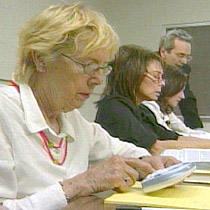2007年VOA标准英语-New Trend Among Those Trying to Prevent Dementi
搜索关注在线英语听力室公众号:tingroom,领取免费英语资料大礼包。
(单词翻译)
By Carol PearsonWashington
18 June 2007
The number of people suffering from Alzheimer's disease is expected to quadruple by the year 2050. Researchers at Johns Hopkins School of Public Health in Baltimore, Maryland, say 106 million people worldwide will develop the disease by that time. They refer to the situation as a "global epidemic," and they say 43 percent of those with the disease in 2050 will require high-level care. The research shows the largest increase in the prevalence of Alzheimer's will occur in Asia, where nearly half of the world's Alzheimer's patients currently live.
These statistics, and the experience of watching loved ones slip into this disease, have more people doing what they can to prevent the onset1 of Alzheimer's. VOA's Carol Pearson reports.
 |
| Participants in a brain exercise class, including Nancy Levitt, center |
Researchers say the factors in brain health are actually dictated3 by things that are under our own control, such as lifestyle and personal health.
That said, many Americans are taking this information to heart to try to enhance the fitness of their brains. At a "brain gym,” people are getting a mental workout with computer programs that exercise the brain like a muscle.
Many Americans, like Nancy Levitt, have watched parents and other family members suffer from Alzheimer's. "I'm more frightened of this than getting in a car accident or something horrible like that," she admits.
So she enrolled4 in a memory class with Dr. Gary Small at the University of California, Los Angeles. "If you learn specific memory techniques, you will improve your memory performance -- not only in a very short period of time, but you can have sustained effects up to four or five years," says the doctor.
Other experts on aging say you do not have to go to a brain gym or use equipment that sends neurotransmitters to exercise your mind. Professor David Loewenstein, at the University of Miami Medical School, says, "There is no data or scientific evidence to suggest that these programs are any more effective than other alternatives, such as anagrams, crossword5 puzzles."
Many people sign up for brain training programs because they are frightened. Says Levitt, "I'm trying to save my own life, make it last longer and better."
Loewenstein says Alzheimer's patients can learn skills that are meaningful, and that these skills can be maintained. Skills such as re-learning the names of common objects. It does not stop the disease, but it can keep an Alzheimer's patient functioning longer.




